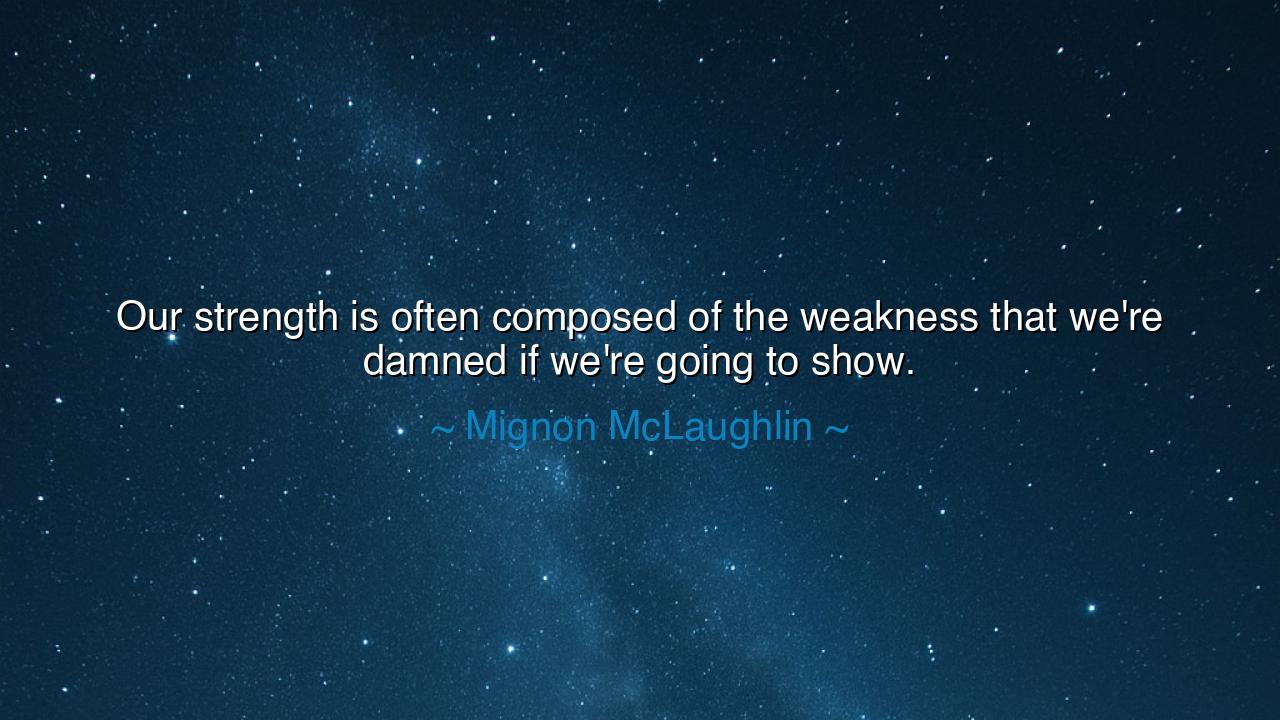
Our strength is often composed of the weakness that we're damned
Our strength is often composed of the weakness that we're damned if we're going to show.






Mignon McLaughlin’s words, “Our strength is often composed of the weakness that we’re damned if we’re going to show,” strike at the very heart of the human condition. They remind us that what appears as resilience, courage, and fortitude in the eyes of others often springs from hidden struggles, silent fears, and pains that we refuse to reveal. In this paradox lies a profound truth: our most enduring strength is often born not from triumph untouched by hardship, but from the very weakness we strive to conceal and overcome.
The origin of this wisdom is rooted in McLaughlin’s sharp observation of human nature. A journalist and author known for her keen, often piercing insights into the inner lives of men and women, she recognized that much of what is admired as power is forged from unseen battles. To the outside world, one appears calm, capable, unyielding. But behind this façade lies trembling, self-doubt, grief, or longing. Yet instead of breaking us, these inner struggles harden into a hidden steel, shaping the strength we present to the world.
Consider the example of Abraham Lincoln. To history he is remembered as one of the greatest leaders of his nation, guiding America through the crucible of civil war. Yet Lincoln was plagued by profound melancholy, carrying grief from personal losses and the immense weight of leadership. His weakness was real, but he bore it with such dignity that it became his hidden strength, giving him compassion for the suffering and the resolve to endure. His greatness was not in the absence of weakness, but in his refusal to let it master him or expose itself in ways that would cripple his mission.
We see this also in the warriors of old. The Spartan soldier stood upon the battlefield, shield raised, face impassive. Behind the mask, he knew fear, as every human does. But that fear, that weakness he refused to reveal, became fuel for his discipline, sharpening his strength until it appeared godlike. To admit nothing, to show nothing, was not the denial of weakness but its transformation into a force that carried him through the clash of blades. Thus McLaughlin’s words remind us that what is called courage is often simply the mastery of weakness kept hidden.
This wisdom teaches us not to despise our frailties. Our doubts, our sorrows, our fears—these are not blemishes that disqualify us from greatness, but the raw materials from which greatness is forged. The very thing we hide becomes the very thing that steels us. The man who suffers loss becomes the one who endures with compassion. The woman who wrestles with fear becomes the one who perseveres in silence until her endurance inspires others. Strength is not the absence of weakness, but the resolve not to be undone by it.
For the seeker of wisdom, the lesson is this: do not curse your hidden battles. Do not imagine that your unspoken fears make you less than others. Instead, recognize that these struggles are the roots of your future fortitude. The world may never see the tears you shed in secret, but they will see the character you forge because of them. What you do not show, what you refuse to surrender to, becomes the bedrock of the strength you carry forth into the world.
The path forward is practical yet profound. When you feel overwhelmed by weakness, do not despair—channel it. Transform doubt into discipline, fear into vigilance, sorrow into compassion. Guard your dignity, not by denying weakness, but by refusing to let it enslave you. Build quietly in the shadows of your pain, and emerge in the light with a strength so tempered that others will marvel, never knowing the hidden fires that forged it.
Thus, let the teaching of McLaughlin endure: our greatest strengths are often the secret offspring of our deepest weaknesses. What we hide becomes what sustains us. The world honors the strong, but only the wise know that behind their glory lies the silent war of the soul. Let your hidden struggles not be your shame, but the hidden source of your power, passed down as a sacred truth to generations yet to come.






AAdministratorAdministrator
Welcome, honored guests. Please leave a comment, we will respond soon